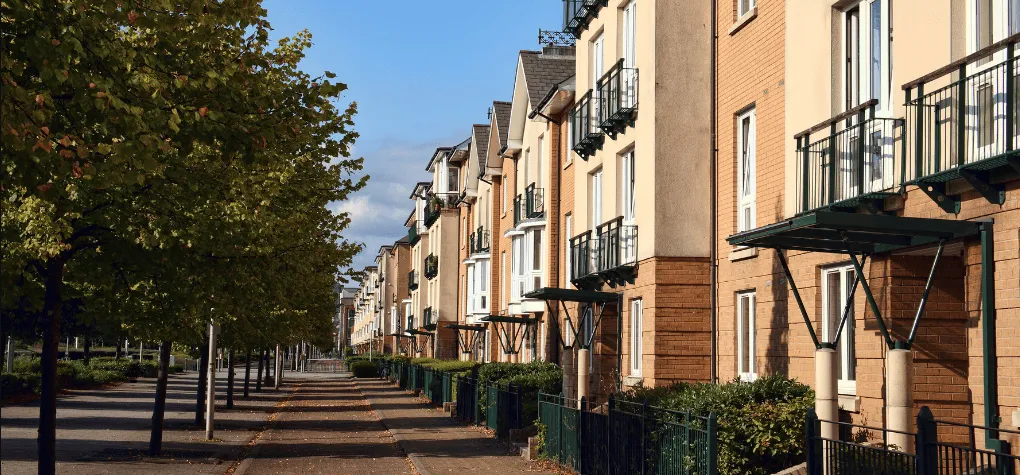
Buying a House
On this page you’ll find helpful tips on buying your new house or flat. From choosing between properties to finding a new home, applying for a mortgage, getting a solicitor and more.
Fill out this enquiry form and we’ll contact you to book a free call with one of our mortgage experts.
Whether you’re a first-time buyer or an experienced homeowner, buying a house is a huge undertaking. Our guide takes you through the process and gives you detailed information on the steps to purchasing a property.
There’s a lot to organise when you buy a house. You need to find the right property, apply for a mortgage, make an offer, instruct a solicitor, have a valuation, exchange contracts and more. A lot of the different stages are carried out by either your mortgage broker, solicitor or lender – but it’s the biggest purchase you’ll probably make, so it’s important you understand what’s going on. Our guide breaks everything down for you.
Contents
Choosing Between Types of Properties

Part of the reason buying a home is so overwhelming is because there are so many options and decisions to be made – where should you live? How much can you spend? What kind of property do you want? What exactly are you looking for in a home?
You don’t need to drown in these questions. Before you can possibly choose what type of property you want, you need think about what sort of area you want to live in. Start by making a list of criteria that you want from your neighbourhood, e.g. a good school nearby, convenient local transport links, shops and restaurants, etc. You may already have a certain area in mind – find out more about it so you have a clearer idea of where to look within that area.
Now you can start thinking about the type of property you want to buy. House or flat? Pinpoint exactly what you’re looking for in a home. What do you envision for your family? What are your requirements? This is where you decide how many bedrooms you want, whether you want a garden, a garage or maybe a stairless property.
A huge factor you need to consider is obviously price. It often determines the type of property available to you. Not only do you need to think about the property value but also the cost of maintaining it. Running costs like heating and can sneak up on you, particularly in larger or older buildings. When buying a house, it’s important to look for traits that suit your long term needs – e.g. good insulation. It’s also worth noting that newly built homes often require less upkeep in the first few years.
Finding your perfect home is never easy, whether it’s your first time buying a house or your tenth. You may have to compromise. Ask yourself what you value most in a property. For example, you might be prepared to live in a smaller property if it’s in the catchment area for a particular school.
Freehold or leasehold?
Once you have a better understanding of what you’re looking for, you can start to learn about the different types of home ownership.
Freehold
If you have freehold ownership, you own both the building and the land on which it stands in perpetuity. Most houses are freehold.
As the owner of a freehold, you:
- Won’t have to pay annual ground rent
- Are responsible for maintaining the property – including the roof and the outside walls
Leasehold
If you have leasehold ownership, you own your property for a fixed term but not the land it stands on. Flats are normally leasehold. The leases are usually long term but can range in length. A leaseholder has a contract with the freeholder, which sets out the legal rights and responsibilities of both parties.
As a leaseholder, you:
- Must pay for maintenance fees, annual service charges and your share of the building’s insurance
- Will likely pay ground rent annually to the freeholder
- Must obtain permission to perform any majors works on the property – e.g. knocking down walls
- May forfeit your lease if you fail to pay ground rent in accordance with your contract
You can find out more in our guide on Freehold and Leasehold properties.
Finding a Property
Once you’ve decided on potential areas and chosen your property type, contact as many local estate agents and register as a potential buyer. You can ask them to send you regular details of suitable properties on their books.
If you’re looking in a competitive area, do some independent research online. It’s also worth calling your estate agent once a week to ensure you get an early look at properties that have only just been put on the market.
One thing to bear in mind: it’s perfectly normal to like multiple properties equally. Nonetheless, confusion can make the process a lot more stressful, so keep records of your viewings which outline the good and bad points. You can use these to make an informed decision.
Questions to ask when viewing a house
Here are a few examples of some questions to consider when viewing a property:
- How old is the property?
- You can easily find this information via The Land Registry or save time and ask your estate agent.
- Which Council Tax band is the area in?
- You pay Council Tax whether you own or rent a property. Figuring out how much you’ll have to pay will give you a better idea of the long term costs to expect in a certain property. You can find out how much Council Tax you’ll pay by checking your band then visiting the website of your local council.
- What is the EPC rating of the home?
- An EPC (energy performance certificate) indicates the energy efficiency of a home in monetary value. EPCs are rated A – G, with A being the most efficient. A property with an EPC of C or above will usually be cheaper to run, eligible for green mortgage products and more sustainable in the long term. You can check the EPC rating of property on the GOV website.
- When can you move into the property?
- Maybe you’re moving for a new job, or your tenancy is coming to the end. Whatever the case, you should ask your estate agent about move in dates early on; you don’t want to lose out because of an unforeseen timing conflict.
- How long has the property been on the market?
- If a property is new to the market, it will attract more attention from potential buyers, which means you’ll face greater competition. On the other hand, if a property has been on the market for a long time, you should find out the reasons why – there may be an issue you’re unaware of.
- Is the house north or south-facing?
- The direction of your house might seem trivial, but it can have a huge impact on its temperature throughout the year. Finding out will give you a better indication of what to expect as the weather changes.
- What’s the area like?
- Your neighbourhood is just as important as the property you choose. Find out what’s nearby. Are there local shops? Busy roads? What’s the public transport like? The local area will reveal a lot about the people who live there and will potentially become your neighbours, e.g. a local school indicates nearby families, a vibrant nightlife suggests young people, a university suggests students, etc.
Applying for a Mortgage
Most people need a mortgage to afford a home because it’s such a big purchase – and few people have that much money saved up.
Below is an overview of the main steps involved in Applying for a Mortgage.
If you use a John Charcol mortgage adviser, you’ll have our assistance at every point of the journey. We’ll help you complete every step and answer all your questions.
Credit check
Before applying for a mortgage, you’ll want to check your credit score. This is one of the key factors lenders use to determine your eligibility for a loan and the interest rate they will offer. A higher credit score can lead to more favourable loan terms.
Determining your budget
You’ll need to figure out how much you can afford to spend on a home, considering both the down payment and the ongoing monthly payments. Use online mortgage calculators to help estimate how much you can borrow based on your income, debts, and other financial commitments.
Shopping for a mortgage
It’s a good idea to compare first-time buyer mortgage rates and terms from multiple lenders, including banks, building societies and specialist lenders. Make sure you consider different types of mortgages (e.g. fixed rate, variable rates) to see which best fits your needs.
Decision in Principle
Once you’ve compared offers, you’ll choose a lender and apply for a Decision in Principle. This involves a lender checking your credit and financial documents to determine how much they would be willing to lend you. A pre-approval can make you a more attractive buyer to sellers as it shows you can afford the mortgage.
Offer on property
Once you’ve secured your DIP, you’ll be in a great position to make an offer on a property.
Full mortgage application
You’ll be ready to submit your full mortgage application after your offer is accepted on the property you want to buy.
Submitting your mortgage application involves filling out a loan application and providing the financial documents that verify your income, assets and debt.
Here are some examples of the various documents you’ll submit to your lender or broker when applying for a mortgage, including:
- Proof of income (e.g. pay slips, tax returns)
- Proof of expenditure (e.g. bank statements, savings accounts)
- Credit history
- Identification (e.g. driver’s license, passport)
- Documentation of any debts (e.g. car loans, credit cards)
Loan processing
After you’ve applied, the loan will go through processing where the lender verifies all the information you’ve provided, checks your credit again and assesses the property you want to buy.
Home valuation
Your lender will require a home valuation to confirm the value of the property you’re buying. This ensures that the loan amount is not more than the home’s worth.
Underwriting
During underwriting, the lender further evaluates your financial details and the appraisal to make a final decision on whether to approve your mortgage application.
Exchange and completion
At exchange you make any necessary deposit transfer and your solicitor takes care of transfers between lenders and the seller’s solicitor. On completion, you’ll be the owner of the home.
Tips for success
- Stay financially stable: avoid making large purchases or taking on additional debt between mortgage pre-approval and mortgage offer
- Respond promptly: provide any additional information your lender needs as quickly as possible to avoid delays
- Understand the costs: be aware of not just the mortgage itself but also potential associated costs like closing costs, valuations or surveys, Stamp Duty, building insurance, mortgage protection cover
- Use a John Charcol mortgage adviser: our experts will help ensure the process runs smoothly. They’ll listen to you and learn everything they can about your situation, then they’ll find you the best options and take you through the application process
Finding a Solicitor
You need to hire a reliable solicitor or conveyancer when you start looking for properties. They carry out certain, necessary tasks when buying a home.
Your solicitor or conveyancer will:
- Obtain the deeds which prove the property legally belongs to the person you’re buying it from
- Research where the property’s legal boundaries lie
- Prepare an inventory that makes it clear which fixtures and fittings are included in the purchase price. This form will also ask the vendor whether they’re aware of any material, structural or other defects to the property that you should know about
- Advise you on a draft contract for sale that’s prepared by the seller’s solicitor and sets out the terms of your purchase
- Carry out a search of local planning information to uncover details of any upcoming developments, like a new road, which could affect the property’s value – often known as local authority searches
- Obtain an environmental search which will show locations where chemicals are stored or heavy industrial commerce is based
- Agree a date for completion which suits both you and the property’s seller
- Manage the exchange of contracts and subsequent completion stages of the purchase
Your choice of solicitor isn’t normally an issue for most lenders, but it’s beneficial to check whether your solicitor is registered and recognised by one of the following agencies before you hire them. Lenders almost always require legal firms to have at least 2 partners, as one partner must act on your behalf and the other partner must act for the lender.
To check out your chosen solicitor or conveyancer, just contact:
The Law Society
The Society of Licensed Conveyancers
When you apply for a mortgage through John Charcol, we can provide you with a list of conveyancers we’ve worked with before and recommend. They’re often able to work with you online, by phone or by post.
Making an Offer on a Property

Once you’ve chosen your property, you make an offer to the seller through their estate agent. Most sellers allow a certain amount of leeway, so it’s typical to initially offer below the asking price. Your first offer might be up to 10% less. It’s then up to the seller to either accept that price or try to negotiate a higher one. If there are several potential buyers interested in the property, the seller may have enough bargaining power to insist that you meet their full asking price.
Assuming everything goes smoothly – the seller will accept your offer. It’s better if you already have a DIP (Decision in Principle) from a mortgage lender as this shows the seller you’re prepared and demonstrates that you can afford the property. The estate agent will confirm the seller’s acceptance in writing, called the Memorandum of Sale. The acceptance of your offer is not legally binding until you and the seller exchange contracts.
What's Gazumping?
Gazumping is when another buyer outbids you on a property you’re in the process of buying and the seller accepts their higher offer. This process pushes you out of the purchase and can happen any time before you’ve exchanged contracts. Sellers are more likely to accept other offers if you’re taking too long to survey the property, the sale of your home is dragging on, or if your solicitor is processing things too slowly.
Scotland and gazumping
Under the Scottish system, sellers generally set a certain date by which all bids for the property must be in. They then make their decision from those bids and confirm their acceptance in writing.
If the seller gets a better offer and wants to change their mind, the solicitor will refuse to act on the new transaction, as doing so would leave them open to charges of professional misconduct – so gazumping, or gazundering, is extremely rare in Scotland.
What’s Gazundering?
Gazundering is rarer than gazumping, however it does still happen. It’s where a purchaser waits until very late in the process, usually just before exchange of contracts, to tell the buyer that they no longer want to pay the agreed upon price but want to reduce the amount. This is a vehemently frowned upon practice and only tends to occur in a falling market. There are risks involved with this as chains can break down. Also, the party doing the gazundering can develop a reputation among estate agents which might make it harder for their offers to be accepted in future.
Conducting a Survey

Before a mortgage application can be accepted, your lender will instruct a surveyor to carry out a valuation. A standard valuation for lending purposes is required by all lenders, but there are other types of survey. All valuations are carried out with the mortgage application, before an offer is made.
If a survey reveals serious problems, such as subsidence or rot, you’re free to withdraw your offer as you haven’t exchanged contracts yet. In situations where the problems can be fixed, you’re sometimes able to negotiate a lower price to compensate you for any expenses involved or the vendor can get them fixed prior to completion – preferably prior to the exchange of contracts.
There are 3 levels of survey:
Valuation for Lending Purposes
Once you’ve submitted your application, the lender will require a survey to assess the property’s condition and value. This survey is usually carried out after your application has passed the first stage of underwriting. A valuation for lending purposes isn’t a detailed report. It helps the lender ensure that the property is worth what you’ve asked for and that there aren’t any significant problems that would make the property unsellable, e.g. there’s no working kitchen or bathroom. A valuation for lending purposes is completed by way of an internal inspection or a “desktop” (computerised) valuation.
Homebuyers’ Report
A homebuyers’ report comments on the condition of the parts of the property which are easily accessible or visible. It’s the same as a valuation for lender purposes, except that the valuer will prepare a report for you identifying the need for any future work on the property, e.g. rewiring, signs of damp, refitting facilities, etc. You can have a homebuyers’ report completed independently or pay the lender to carry one out at the same time as a valuation for lender purposes.
Full Structural Survey
A full structural survey involves a more extensive investigation than a homebuyer report. It’s where a structural surveyor looks at the structural integrity of the property. This type of survey is more expensive but contains greater detail on any work the property may need. Structural surveys are always optional but they’re advised if you’re buying a 200+ year old property or if you’re planning on doing significant work on the property, e.g. an extension, renovation, new roof etc. For a full structural survey, you would hire an independent structural surveyor; the lender won’t arrange one for you.
Exchanging Contracts
After your survey is complete and your lender has approved your mortgage application, your solicitor should have a draft contract ready for you and the seller to sign. Once you sign, the solicitors will arrange a time to exchange contracts. Exchange is the point at which you’re legally bound to buy the property. It’s also when you put down a deposit.
You can’t pull out after exchange, or you’ll lose your deposit. So it’s important you make sure you’re committed to the purchase well in advance of this stage.
There are sometimes alternative arrangements if you’re selling your house and buying another, and all the deposit is coming from the equity in the property you’re selling. In this case, the solicitors will come to an arrangement where there is still some consequence should a party pull out after exchange.
You also need to make sure that the building is insured, as you’re now legally obliged to buy it. Your solicitor will likely guide you through this part.
Before committing to the sale, you must check that:
- Your solicitor has completed all the local searches
- The surveyor’s report is complete and accepted by all concerned
- You’ve received a formal mortgage offer in writing which you have read and understood, plus any conditions attached to the offer
- You have the agreed deposit available
- You’ve agreed a firm completion date for the sale and this date is noted in the contract
- There are no outstanding issues remaining to be settled between you and the seller
Your solicitor will deliver your signed contract to the seller’s solicitor and you’ll receive a copy of the version that the seller has signed. From this point onward, both you and the seller are legally committed to the deal.
Moving In
Moving home is hassle. Make it easier on yourself with our free concierge service. Our partners at Just Move In can set up your utilities, notify your local council, arrange packing and unpacking services and more – all alongside actually moving your possessions to your new home. It’s completely free to John Charcol clients.
We recommend following these steps after you exchange contracts with the seller:
If necessary, book a removal firm to transport your belongings on the day of completion
Pay the money needed to buy the property on the agreed date, minus any deposit already paid at exchange – your solicitor will probably take care of this for you if you need a mortgage
Collect the keys to your new home from the estate agent once payment is confirmed
Contact the companies that supply your gas, electricity, water and broadband services to let them know you’re moving out. You should also read the meters in your old home so you don’t end up paying for services once the next occupant moves in
Ask the Post Office to temporarily redirect your mail
Notify your local council that you’re moving so you’re not liable for Council Tax payments at your old address and so they can update your records on the electoral register
Get in touch with our experts
Book an appointment with an adviser today and we’ll help you work out which mortgage deal is best for you and your requirements.
Read More Mortgage Guides
See also
Looking Ahead at 2026
What Happens if Mortgage Rates Drop Before Completion?
Should a Down Valuation Be Seen as a Negative or a Reflection of the Current Market Value?
April Mortgages’ 100% Fixed Rates
What Is Buy Now Pay Later and What Does It Mean for My Mortgage Applications?
Early Repayment Charge – ERC Mortgage
Should First Time Buyers Continue Renting or Take the Leap into Homeownership?
Avoid Making a Costly Mistake by Not Checking When You Go onto the Lender’s SVR

